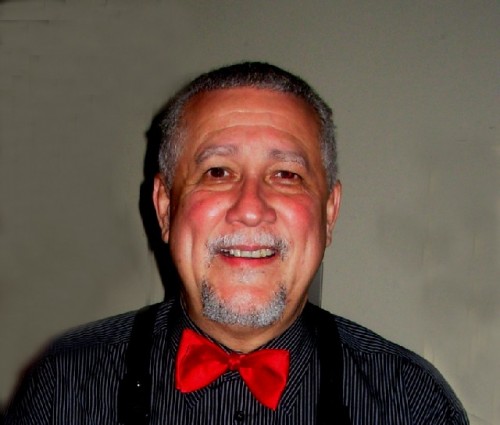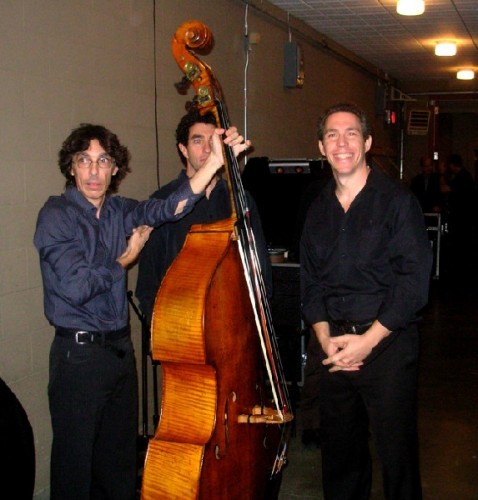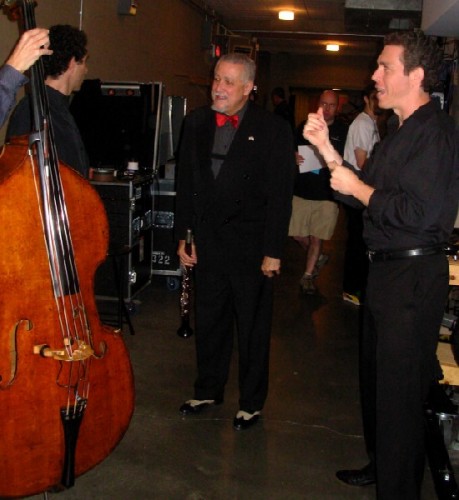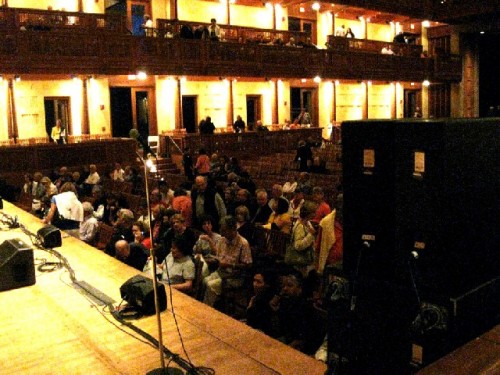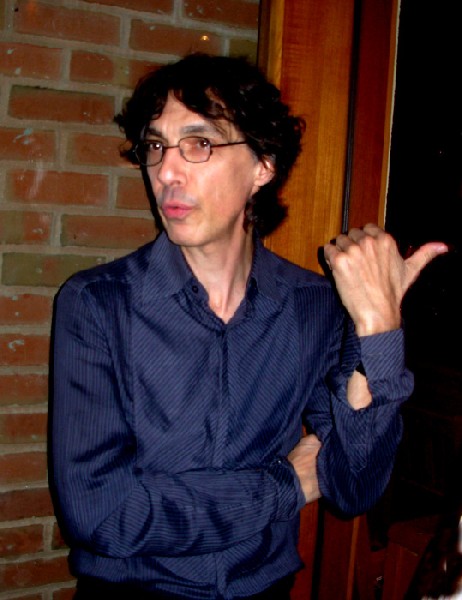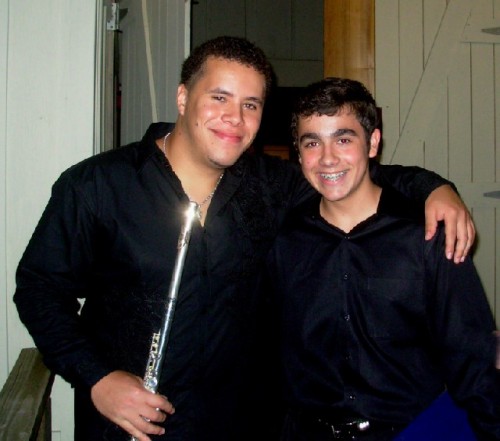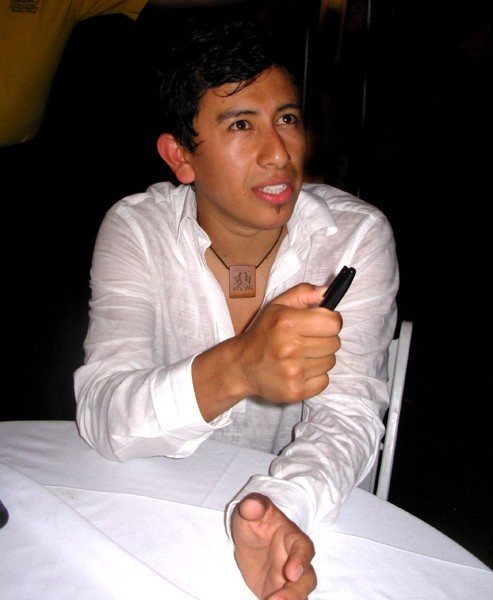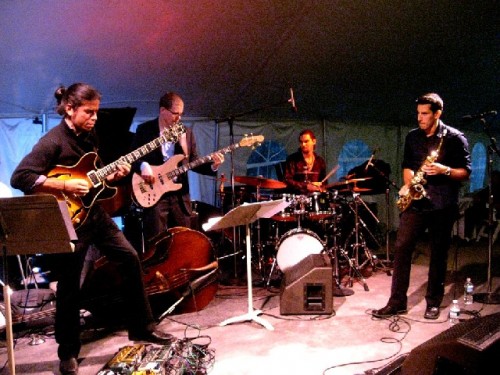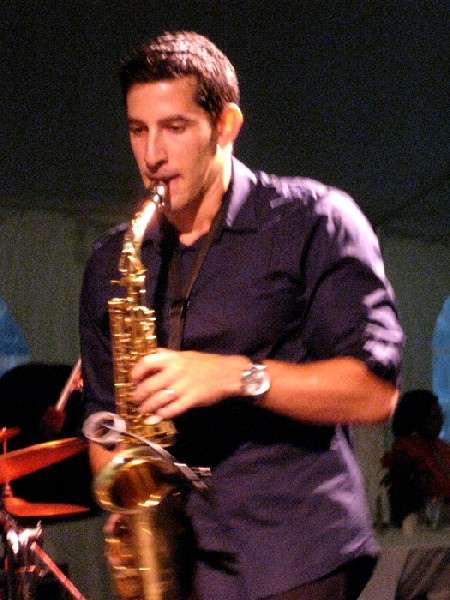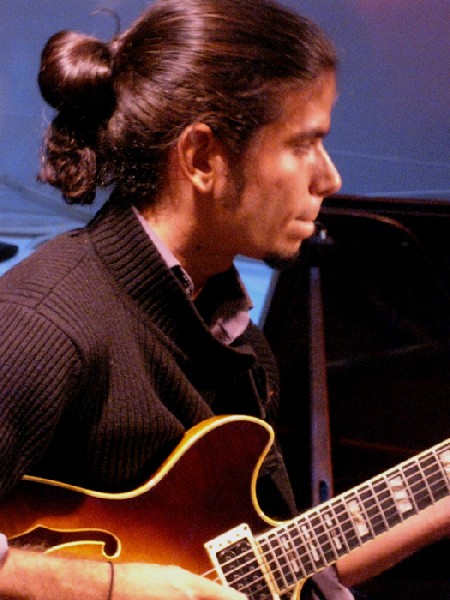Paquito d'Rivera Opens Tanglewood Jazz Festival
A Berkshires Labor Day Tradition
By: Charles Giuliano - Sep 05, 2009
The Tanglewood Jazz Festival opened last night with a sensational program featuring nine time Grammy winner and National Endowment for the Arts Jazz Master, Paquito d'Rivera. In addition to his sizzling performances on clarinet and alto, with warmth and wit, he surrounded himself with "Illegal Aliens." He introduced the septet as "what is left of my orchestra. The rest were detained by Immigration and are now playing in Tijuana."
It was my great pleasure to introduce him to the audience that packed Ozawa Hall and filled the lawn beyond. What a rush to stand on that stage. Earlier in the evening I was the MC for the jazz dinner in the Caf� Tent that featured the Benny Reid Quartet. They played straight up bop from their second Concord Jazz CD "Escaping Shadows" which will be released on September 15. The food by the way was terrific. Drop in for Michael Kaeshammer, Saturday, 12:30 pm, Evgeny Lebedev Trio, Saturday at 6:30 pm, The Kat Edmonson Sextet, Sunday at 12:30 pm and Ben Powell Quartet, Sunday at 6:30 pm.
The concept of the Caf� is to introduce new artists. Two years ago the Colombian harp player Edmar Castaneda was the buzz of the festival. In 2008 he was brought back as a featured artist. Last night he was part of the group that accompanied d'Rivera on "Pan Americas" a suite presenting the instruments and variety of the music of Latin America.
The Cuban born and trained d'Rivera was an established star of both jazz and classical music when he sought and gained political asylum in the American Embassy while touring in Spain in 1981. He has won Grammy Awards for both jazz and classical recordings. In addition to being a renowned performer he is also a superb composer as was demonstrated at Tanglewood.
In addition to serving as a charming and amusing host d'Rivera is also an ambassador of Latin and Hispanic music. The rich and diverse program with truly sensational performers greatly widened the perception of the audience. There were challenging aspects to the music with complex polyrhythm that were difficult and cutting edge. But he could also dig down into a groove and dance along with a Samba or Mambo. He seemed to enjoy unleashing the raging torrents of a rhythm section of Alex Brown piano, Oscar Stagnaro bass, Mark Walker drums, Pedro Martinez, congas and percussion. They ripped it. The music could he heady, intoxicating, and cerebral as well as funky and gut bucket.
All of these elements conflated into one of the most riveting musical experiences we have ever encountered in Ozawa Hall. Of course the obvious question is why we don't have more of this programming interspersed during the Tanglewood Season? It seems a no brainer that Tanglewood might initiate a Caf� Jazz brunch or dinner series. It would be a treat for audiences while providing prestigious exposure for emerging artists.
One of the ancillary results of the social experiment of Castro's Cuba is a phenomenal program of arts education. Arguably it is an aspect of Marxist agit-prop. But there is no denying the remarkable impact on jazz of Cuban influences. It dates back to when George Russell arranged "Cubano Be" and "Cubano Bop," featuring the legendary percussionist Chano Pozo (1915-1948), for the Dizzy Gillespie Big Band in 1947. More recently, in 1998, the guitarist, Ry Cooder, and filmmaker, Wim Wenders, collaborated to create "The Buena Vista Social Club" featuring then elderly master musicians of Cuba.
Last night Paquito presented a tribute to one of the mythical Mambo Kings, Israel "Cachao" Lopez, a bass player, who is credited with inventing mambo as well as the Afro-Cuban "descarga" jam. He is remembered for recording with an orchestra in the morning, a TV band in the afternoon, and then off to a jazz club that night.
The work "Conversations with Cachao" was originally composed as a double concerto for contrabass, clarinet, percussion and piano. The rarely performed piece was too expensive to present at Tanglewood in its full orchestral score. Paquito often made jokes about his tight budget and how much he was paying his side men. It is what he meant by remaking that "This is all that's left of my orchestra." But however reduced they acquitted themselves admirably. He told us that Regina Carter appears on the latest CD but "she is so expensive, she charges so much." She will appear with her quartet tonight in 'Reverse Thread."
The program opened with a new arrangement of "Cachao" for four instruments. In addition to d'Rivera on clarinet and alto, there were Robert Black on bass, and the brothers Landes, Garah on piano and Gregory on percussion. There is a four note theme of "Conversations" at the beginning of the first movement "Israel." The middle section "Guajira" refers to a country musical form in Cuba. The third movement "The Return" Paquito states is "the dream on the mind of every exile." Cachao left Cuba in 1962 and lived in Miami until his death in 2008.
The audience applauded after the first movement but Paquito reminded us that there were two more to follow. But there was no restraining the outburst following the solo by Black. Truly I have never witnessed a greater virtuoso performances of jazz bass. It was up there with Mingus, Paul Chambers, Slam Stewart, and Ron Carter. Start with the rich raspy sound of his bowing. Then the pizzicato strumming. In the final phase he beat all over the instrument with his hands, turning the fiddle into a drum.
Following a Standing O for "Cachao" Paquito turned over the stage to two young musicians from Miami, Tony Madruga on piano and Jose Valentino flute. He explained that the composition he wrote "Fiddle Dreams" is so difficult and complex that "I can't play it." They were just wonderful and again the audience awarded them with a Standing O. He remarked that we need to hear more great young players. Right on. They were brought back to join the septet for the finale.
The second half of the program found Paquito in more of a Latin Dance mode. In a segment on the Tango he featured Hector del Curto from Argentina. The instrument he played is the bandoneon which is a form of accordian with four keyboards. He explained that the instrument is essential to the Tango. He soloed on "Boedo" by J. de Caro.
Edmar Castaneda astonished the audience. The Peruvian harp he plays is somewhat smaller that that of a symphony orchestra. It is, of course, a rare instrument in jazz another player being the Swiss artist Andreas Vollenweider.
The suite for the Americas "Panamericana" brought out all of the textures and range of Latin music including poetry and song provided by the wonderful Brenda Feliciano. In addition to the reeds of d"Rivera there were sharp brass accents by Diego Ercola on trumpet and valve trombone. They performed the Mark Walker composition "What About That" and two tunes by Astor Piazzole "Oblivion" and "Libertango."
Then Paquito brought everyone back for some salsa on his "The Brenda with Love.". He explained that it was based on that great Latin composer Johan Sebastian Bach from Brazil. He quipped that in Latin America he is known as "Juanito." It was interesting to hear Castaneda and the other musicians taking turns jamming on a fugue. Kind of like P.D.Q. Bach with a beat. Talk about rocking to the oldies.
We titubated all the way home. And, that's not all folks.

